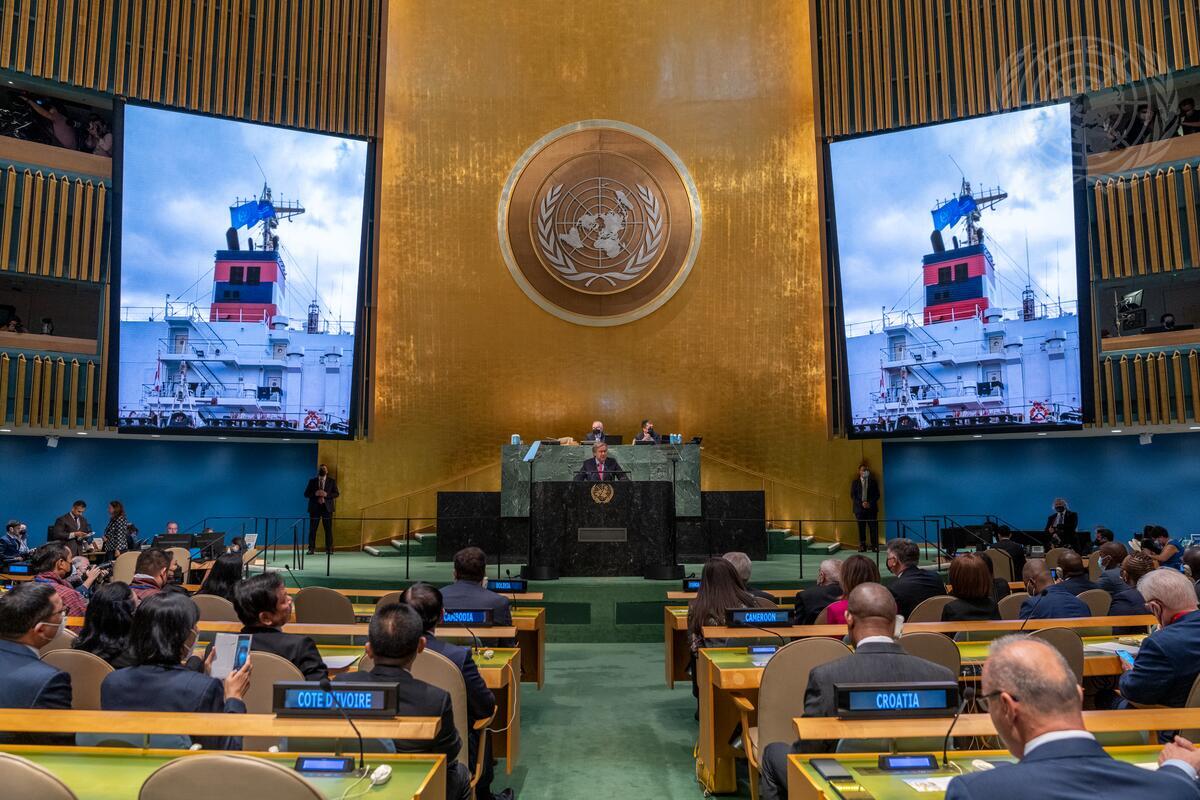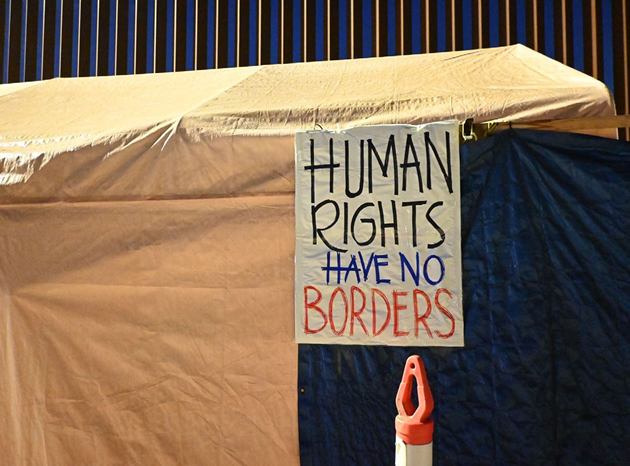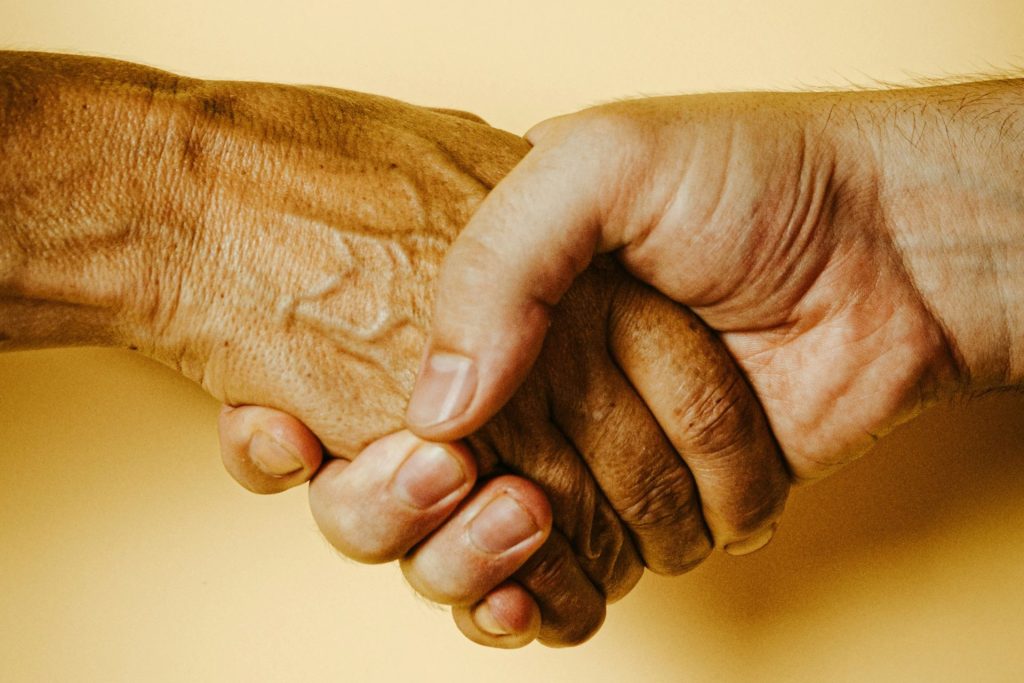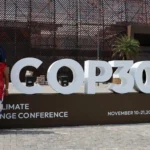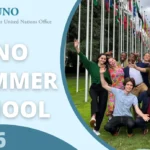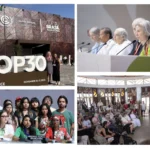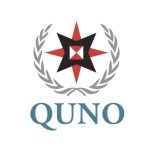Every year world leaders gather at UN headquarters in New York for the opening of the General Assembly (UNGA), with 2022 marking the first fully in person session since the start of the COVID-19 pandemic. The 77th session of the UNGA opened on 13 September, under the theme “A watershed moment: transformative solutions to interlocking challenges.” This year’s opening took place against a challenging global backdrop – the impact of the war in Ukraine, ongoing food and climate crises, rising economic costs and the continued recovery from COVID-19.
While media attention usually focuses on the UN Security Council, the UNGA is a forum where all UN Member States can participate and raise their voices. For Quakers, with our long-standing commitment to equality, we watch the opening of the UNGA carefully to listen, not just to the voices of major powers, but to the concerns of all UN Member States. These statements are essential to build global cooperation and establish the shared norms needed to build a peaceful world. As Csaba Kőrösi of Hungary, UNGA President noted, “responding to humanity’s most pressing challenges demands that we work together, and that we reinvigorate inclusive…and effective multilateralism…”
During the UNGA opening, leaders and activists gathered for the Transforming Education Summit from 16-19 September. Seeking to address the global education crisis, which has only been made starker by the impact of COVID-19, the summit focused on mobilization, solutions and leadership. As Malala Yousafzai declared to world leaders, “if you are serious about creating a safe and sustainable future for children, then be serious about education.” As the summit closed, over 130 countries pledged to act to address education gaps and inequalities. Our New York office welcomes this focus on young people and addressing their needs. QUNO’s work on youth, peace and inclusion involves direct engagement with young peacebuilders to hear from their community experiences and how they have interacted with institutions like the UN. As shared in our recent summary from our listening exercise with young people in the US, meaningful political inclusion and participation of young people is key for peace and sustainable development. Addressing the education crisis will be a step forward for investing in young people, and thus investing in peace.
As the Transforming Education Summit closed, heads of state and foreign ministers came together for the High-Level segment of the UNGA, which began on 20 September. The major topic on the table was the ongoing war in Ukraine. President Volodymyr Zelensky of Ukraine joined virtually, the only world leader to be afforded this accommodation following a General Assembly vote. In addition to speaking to the war’s nuclear threat and human impact, leaders brought attention to its effects on multilateralism. French President Emmanuel Macron stated that the invasion “is undermining the principle of our Organization, is undermining the only possible world order, is undermining peace.” This was echoed by many, including Japanese Prime Minister Kishida Fumio, saying “Russian aggression against Ukraine is an act that tramples on the vision and principles of the UN Charter.” Prime Minister of the United Kingdom of Great Britain and Northern Ireland, Liz Truss, reflected on the present state of geopolitics, noting that this new era is “one that requires those who believe in the founding principles of the UN to stand up and be counted.” When considering the impact of the war, some brought attention to changes that are needed at the UN. US President Joe Biden called on all members of the UN Security Council to “refrain from the use of the veto, except in rare, extraordinary situations, to ensure that the Council remains credible and effective.” He also expressed support for expanding the Security Council membership to include seats for nations from Africa, Latin America and the Caribbean. While the threat to global order and multilateralism looms, the UN Secretary-General spoke to the hope that can also be found when we act together. In his remarks he shared a photo of the ship that is bringing grain out of Ukraine to the horn of Africa and has been able to make the journey following negotiations led by Türkiye. He noted that this ship, and the larger Black Sea Grain Initiative, should be seen as “multilateral diplomacy in action.”
While many global issues have been raised, the climate crisis and ongoing effects of environmental degradation also took center stage. Many speakers spoke about the real-time horrendous impact of monsoon flooding in Pakistan as one-third of the country is under water and expressed solidarity with those suffering. Prime Minister of Barbados, Mia Amor Mottley, had strong words on the issue, declaring that “any attempt to deny that the climate crisis has man-made origins is an attempt to delude ourselves and to admit that we want to be accomplices in the continuing death and loss and damage that ensues to the people who are the victims of it.” President Faustin-Archange Touadéra of the Central African Republic echoed this, stating that “it is time for the for the biggest polluters to honour their commitments, in particular the implementation of the Paris Agreement (…).” David Kabua, President of the Marshall Islands called on world leaders and the UN to address this with “the urgency and commitment it deserves,” and noted that “the world has failed to break our addiction to fossil fuels” and is “not investing enough in adaptation.” To make needed change it is also critical that countries most affected have an equal voice and are partners in these efforts. Speaking to the need for investing in action, President William Ruto of Kenya advocated for steps like addressing plastic pollution, ensuring sustainable use of the world’s oceans and addressing the ongoing challenge of funding climate and environmental work.
The UNGA high-level session closed on 26 September. As the UN Secretary-General noted, this “must be a moment of transformation – for people and planet alike. The time is now.” During the coming year, staff at the Quaker UN Office in New York will support this needed transformation as we continue to work in partnership with UN diplomats and officials to increase the global commitment to the UN’s role as a promoter of lasting peace.

